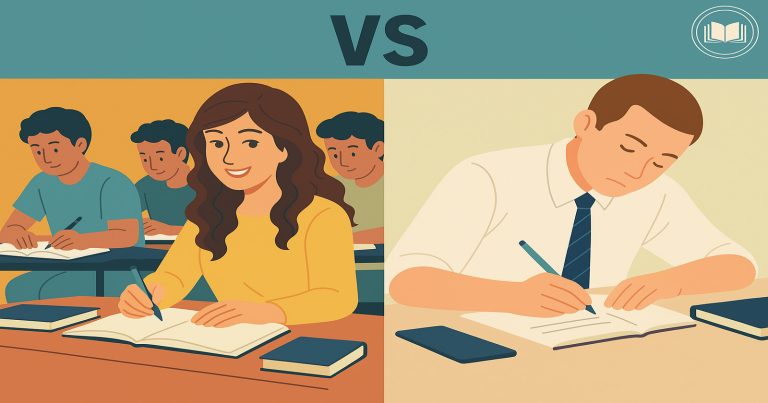Many candidates preparing for the CFA exams often find themselves stuck at the big question—CFA self study vs coaching. Both options have benefits, but which one is better? The answer depends on your learning style, available time, and resources. In short, CFA self study vs coaching has no one-size-fits-all solution. Coaching helps with expert guidance and structure. Self-study gives flexibility and independence. Choosing the correct method early in your journey is part of an effective CFA preparation strategy. This article explores both in detail so you can decide what works best for your goals and lifestyle.
CFA Self Study vs Coaching: Which Is Better for You?
Each CFA aspirant studies differently. Some like reading alone in silence. Others learn better when someone explains things. CFA coaching classes help students who need guidance, fixed schedules, and doubt-solving. A CFA self-study plan suits those who enjoy learning on their own. Understanding your style helps make the right choice early.
Who Should Choose Self-Study?
Self-study is suitable for people with a strong focus. They make their schedules and stick to them. Many working professionals choose this path. They study at night or weekends. A well-structured CFA study plan for working professionals keeps them on track.
Who Should Choose Coaching?
Students who need structure and motivation or find some topics tough often choose coaching. Teachers explain concepts clearly. Group classes help stay motivated. Coaching gives CFA Level 1 preparation a strong start and helps build confidence.
Advantages of CFA Self-Study
CFA self-study is budget-friendly. The cost of CFA exam coaching is high, while self-learners pay for study material. They can use CFA Institute books, mock tests, and a CFA self-study guide. This method works well for those with strong self-discipline.
Students can adjust their pace. If one chapter feels tough, they can spend more time on it. They can take short breaks, revise often, and focus on weak areas. Many candidates follow their CFA exam preparation strategy, which helps them cover topics according to their comfort level.
Also, self-learners get more practice with mock tests. They solve more questions and focus intensely. They also develop strong time management by following their own CFA time management tips.
Challenges of CFA Self-Study
Self-studying can get lonely. No classmates, no teacher, and no one to ask questions. Doubts remain unsolved. Tough topics like quantitative methods or financial reporting have become harder. Candidates waste time trying to understand complex subjects.
Some students lose motivation. They stop following their CFA self-study plan. They get distracted. They also struggle to understand what topics are more important or less. They may study everything without coaching but miss the exam’s key focus areas.
The CFA self-study vs coaching success rate shows that coaching students often score better. The reason is apparent: they get guidance, reminders, and tested methods to learn better.
Why Some Candidates Prefer Coaching for CFA Exams?
Many students join CFA coaching classes to get a well-planned schedule. They know what to study and when. Teachers guide students to stay on track. This works well for beginners and those with less financial knowledge.
Classes include video lectures, notes, live Q&A, and practice papers. Many coaching centres share CFA exam tips and tricks to solve questions faster. Students also receive help from peers, which builds confidence.
Coaching Offers Expert Support
Coaching gives expert help. Teachers break down tough topics into simple parts. For example, complex Derivatives or Portfolio Management formulas become easy when explained with real-life examples. This makes students confident and exam-ready.
Teachers also suggest the best CFA study resources. Good coaching uses tested material. Candidates also get a complete CFA self-study guide, mock tests, and performance reports. These help track progress and improve weak areas.
Coaching Helps Build Motivation
A group of learners often studies better than alone. In coaching, students get inspired by peers. They stay focused. Regular classes and deadlines keep them serious. Also, feedback from teachers pushes them to improve.
Drawbacks of Coaching
Coaching costs more. The CFA exam coaching cost for one level can reach ₹1,00,000. Also, not all coaching centres are good. Some give poor notes or old material. Students must check the CFA exam coaching review before joining.
Fixed class schedules are also demanding for working people. Some classes clash with work timings. If students miss one class, they fall behind. It affects the whole study plan.
Time, Cost, and Success Rate Comparison
Time matters most in CFA exam preparation. Self-study gives complete control. Students plan based on free time. Many working professionals follow a weekly timetable. They use CFA prep tips from blogs and videos. They revise often and solve more questions.
In coaching, students follow the institute’s schedule. This saves planning time. But it also means they must attend classes regularly. If they miss, they lose that day’s learning. Time flexibility is less.
Comparing Costs
Self-study is cheaper. Students buy books, practice papers, and access online lectures. The total cost for all levels stays under ₹80,000. Some students only use the official CFA Institute books.
Coaching costs more. Many centres charge ₹80,000 to ₹1,00,000 per level. Adding all levels, the full course cost may cross ₹2,50,000. Some also charge extra for doubt sessions or mock exams. Here’s a table showing the cost and time difference:
| Factor | Self-Study | Coaching |
| Cost Per Level | ₹10,000–₹25,000 | ₹50,000–₹1,00,000 |
| Time Flexibility | High | Low |
| Weekly Study Time | 15–20 hours | 12–15 hours (Fixed Slots) |
| Doubt Solving | Limited (Online Forums) | Immediate (Live or Scheduled Support) |
Success Rate Comparison
Exact success rates are not published. However, surveys show that coaching students passes more quickly. The reason is apparent: planned guidance, expert support, and regular feedback. Still, many self-study students pass all three levels with dedication. The key is a strong CFA exam preparation strategy and smart CFA study material review.
Common Mistakes in CFA Self-Study
CFA self-study can be an effective and flexible choice. However, many candidates make common mistakes that reduce the chance of success. These mistakes usually happen due to poor planning, weak time management, and misuse of CFA study resources. Students who follow a CFA self-study plan must stay focused, use trusted materials, and avoid wasting time on unnecessary content. Understanding these mistakes early helps create a stronger CFA preparation strategy and increases confidence. Candidates can avoid delays and confusion by learning how to study CFA effectively and following a solid CFA self-study guide.
Not Following a Fixed CFA Self-Study Plan
Without a fixed study plan, CFA candidates often lose track. They study one topic too long and leave others incomplete. Many working professionals skip study sessions due to fatigue or lack of motivation. A structured CFA self-study plan should have weekly goals, chapter targets, and revision blocks. Failing to plan is the first reason many students fail, especially at the CFA Level 1 preparation stage.
How to avoid?
Create a clear timetable based on work hours, personal commitments, and topic difficulty. Use planning tools or apps to track study progress. Break topics into 30-minute sessions for better focus and retention.
Using Too Many or Unreliable CFA Study Resources
Students often get confused with too many books, websites, and videos. Some rely on free but outdated content. This leads to wasted time and poor understanding. Choosing poor CFA study material increases stress before exams.
How to avoid?
Use trusted CFA study material review websites to select reliable sources. Stick to the CFA Institute curriculum and one or two well-reviewed prep providers. Avoid switching between different sources. Focus on quality, not quantity.
Ignoring Practice and Mock Exams
Many self-study students skip practice tests. They think reading is enough. However, CFA exams focus on application, not theory. Lack of practice hurts both accuracy and time management.
Poor Time Management
Some students leave too much for the last month. They feel confident early, then panic as exams come near. This mistake often leads to failure, even if students understand the content.
How to avoid?
Follow CFA time management tips throughout the study journey. Divide your preparation time into learning, revision, and mock test phases. Don’t skip revision.
How to Create a Balanced CFA Study Plan for Working Professionals?
Balancing CFA studies with a full-time job is hard. Most candidates work 8-10 hours a day. They often lack energy or time to study regularly. However, a proper CFA study plan for working professionals makes success possible. Thoughtful planning, proper resource selection, and time discipline help busy aspirants crack CFA exams. Candidates must follow a strict CFA preparation strategy and use their weekends wisely. With some planning, even 2–3 hours of daily study can lead to success. Many successful candidates use a hybrid model: part coaching and part self-study, which works well for tight schedules.
Plan Early and Define Study Blocks
Early planning gives more time for revision. Begin your CFA Level 1 preparation at least six months before the exam. Divide your study plan into learning, revision, and mock tests.
Study block example
| Month | Focus Area |
| Month 1–3 | New Topics (1–2 per week) |
| Month 4 | Revision & Concept Building |
| Month 5 | Practice Tests & Mocks |
| Month 6 | Final Review |
This structure ensures every topic gets enough attention. Working professionals can study 2 hours on weekdays and 4–5 hours on weekends.
Choose Resources that Save Time
Busy candidates must avoid wasting time looking for materials. They must select high-quality CFA study resources early. Choose one solid CFA self-study guide, reliable mock test banks, and short topic-wise videos. This avoids overload.
Example
Use CFA Institute’s portal + Kaplan Schweser or Wiley + one mobile app for practice. Use weekends to revise what was learned during the week.
Use Time Management Techniques
Following CFA time management tips makes studying less stressful. Plan daily tasks, stick to timers, and avoid long breaks. Take short quizzes to keep concepts fresh. Use apps like Forest or Pomodoro timers to boost focus.
Set goals like:
- “Finish 30 pages before dinner”
- “Solve 20 questions before sleeping”
These micro-goals keep momentum steady even after a long workday.
Track Progress Weekly
Working professionals must track weekly goals. Missed topics must be added to weekend schedules. Use a simple checklist or a Google Sheet to monitor completed topics and mock test scores.
At the end of each week:
- Review what was covered
- Adjust the following week’s target
- Plan a mini-test or concept quiz
This process avoids last-minute panic and creates a well-paced CFA exam preparation strategy.
CFA Self-Study vs Coaching FAQs
- Is self-study better than coaching?
Self-study works well for candidates who are disciplined and organised. It allows for flexibility and cost savings, but demands consistency. Coaching is better for those who need structure, doubt resolution, and guidance.
- Can CFA be done without coaching?
Yes, many CFA charterholders have cleared all three levels through self-study alone. The CFA Institute materials are sufficient if used thoroughly. However, coaching can help if you struggle with self-paced learning.
- Is self-study enough for CFA?
Absolutely, as long as you can dedicate around 300 hours per level and follow a disciplined plan. Resources like CFA Institute books, mock exams, and online forums can support your prep. Time management is key to success.
- Which level is most difficult in CFA?
CFA Level 2 is considered the toughest due to its vast syllabus and application-based questions. Many students face difficulty adjusting from Level 1’s format. Success depends on early preparation and continuous practice.
- What resources help best with self-study?
CFA Institute’s Learning Ecosystem is a top resource, offering readings, quizzes, and practice questions. Supplementary providers like Schweser, FinTree, and AnalystPrep offer summary notes and mock exams. A good mix of both is ideal.


